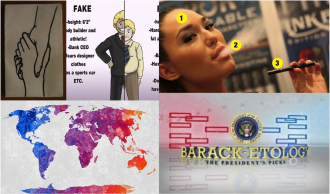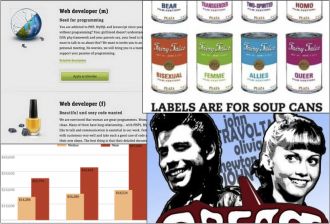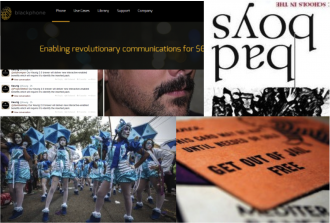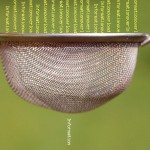 Spring Break. March Madness. Yet another snow storm. A new volume in production and two getting ready to go to the press. There are lots of great reasons that TSP’s HQ has been quiet this week, but of course, our ambitious grad students, dedicated SSN fellows, and dogged bloggers have been spreading the soc, rain, shine, or sleet (all of which have fallen on us, by the way… we get all the weather). more...
Spring Break. March Madness. Yet another snow storm. A new volume in production and two getting ready to go to the press. There are lots of great reasons that TSP’s HQ has been quiet this week, but of course, our ambitious grad students, dedicated SSN fellows, and dogged bloggers have been spreading the soc, rain, shine, or sleet (all of which have fallen on us, by the way… we get all the weather). more...
 Sometimes, time gets away from you! As does debt, as shown in this week’s contribution from Dr. Jason Houle, showing the increase and changes in debt over three generations. Other things that can get away from you: March Madness (I mean, it’s called Madness), the reproduction of sexism and racism, and parental worry.
Sometimes, time gets away from you! As does debt, as shown in this week’s contribution from Dr. Jason Houle, showing the increase and changes in debt over three generations. Other things that can get away from you: March Madness (I mean, it’s called Madness), the reproduction of sexism and racism, and parental worry.
Features:
“Out of the Nest and Into the Red,” by Jason N. Houle. Three generations of debt reveal changing ideals and life courses. Oh, and debt. more...
It’s that time of year. So when our university media relations folks called, I agreed to do a little segment for the local Fox News Station (channel 9, in the Twin Cities market) on the madness of the NCAA’s annual college basketball tournament. Turned out, the TV team wanted to talk about its impacts on office productivity–not exactly something I’m an expert on. Luckily, I got a few leads from former Contexts graduate board student editor Wes Longhofer (who is now in the business school at Emory University) on research suggesting that while productivity does decline a bit, it is more than offset by increases in workplace morale. (See here, for one such study.) I’m not exactly sure about the methodology and all, but it was a starting point.
Anyway, I told the producer I could talk about the relationship between productivity and morale a bit, and then try to explain–from a sociological point of view, of course–both why morale may be more important than we often realize *and* why sport provides such a great context for building office culture and community. I also said I wanted to say a bit about the dangers and limitations of all this, especially who might be left out of this (think, gender and those who don’t like sports) and how and when things can get out of whack (think sports obsessiveness and excessive gambling). I even provided links to a couple of pieces on community and gender I’ve written that I thought would be useful for prepping and framing these points.
![]()
Nicholas Kristof’s recent critique of sociology, political science, and the humanities for effectively isolating themselves from larger and more public discussions of social issues has resulted in a myriad of academic responses, including one from TSP’s own Chris Uggen who offered the New York Times writer a free subscription to this website. (For a “roundup” of responses, see Jessie Daniels at JustPublics@365). As part of this ongoing conversation, Larry Jacobs, of the Humphrey Public Affairs school at the University of Minnesota and the Scholars Strategy Network (SSN), organized a panel last week called “Scholarly Balance: Engagement, Activity, and Rigor.” The panel–which included scholars from political science, public affairs, and cultural studies and comparative literature and played to a full house–produced a provocative and wide-ranging set of responses so our our crack production team has now turned it into a podcast called “Knowledge Production and Public Engagement (a Panel Discussion).” We encourage you to take a listen.
I’d also like to add one other piece to the discussion (perhaps because it aligns with some of the points I tried to make in the podast exchange): Ezra Klein’s “The Real Reason Nobody Reads Academics.” Beginning from the proposition that “the relationship between academics and journalists should be a happy symbiosis,” Klein’s main point is about academic publishing. “The real problem is that the primary system for disseminating academic research–through professional journals and working papers–doesn’t work for anyone but academics and it may not even work for them.” “Journalists,” he writes, “know that academia holds a university of valuable information; they just can’t find a reliable way to tap it.”
Klein has a number of constructive observations to offer and claims that the chasm between academics and journalists may be closing with online forums like the Monkey Cage out of political science or Mark Thoma’s Economist’s View. (I guess he hasn’t gotten his free subscription to The Society Pages yet). But I was particularly intrigued by his final suggestion that it would be better if academics didn’t have to blog or know a blogger to get their work in front of interested audiences because, ostensibly, because this is work that journalists could and should be better at doing. I don’t know if he is right about that or not; but if he is, it would save us here at TSP a lot of time.
ezra klein
http://www.bloombergview.com/articles/2014-02-28/the-real-reason-nobody-reads-academics?utm_content=bufferee11c&utm_medium=social&utm_source=twitter.com&utm_campaign=buffer
—————–
![]()
 This week we talked about American debt and folded a whole new and incredibly interesting sector of debtors into the conversation: those who’ve gone through the criminal justice system. That’s careful wording, by the way, because you don’t even have to be convicted—just charged—to start racking up legal fees with compounding interest and compounding effects on your future. We also got a look at how race affects school suspensions and the oft-overlooked problem of homelessness among college students. No, it’s not all good news, but with the right information and appropriate action, we can keep moving toward the good news, right? That’s worth something! For palate cleansers, we offer the annual Mardis Gras archive, the DRM-coffee-bot, and why we shouldn’t let law enforcement end up based on the quality of business owners’ gaydar. mesothelioma more...
This week we talked about American debt and folded a whole new and incredibly interesting sector of debtors into the conversation: those who’ve gone through the criminal justice system. That’s careful wording, by the way, because you don’t even have to be convicted—just charged—to start racking up legal fees with compounding interest and compounding effects on your future. We also got a look at how race affects school suspensions and the oft-overlooked problem of homelessness among college students. No, it’s not all good news, but with the right information and appropriate action, we can keep moving toward the good news, right? That’s worth something! For palate cleansers, we offer the annual Mardis Gras archive, the DRM-coffee-bot, and why we shouldn’t let law enforcement end up based on the quality of business owners’ gaydar. mesothelioma more...
 This week TSP featured great content on immigration, drugs, and healthcare reform from heavy hitters, as well as the incredibly popular Sociological Images monthly recap and a caveat from our editor, keen even with one eye on the Klout scores.
This week TSP featured great content on immigration, drugs, and healthcare reform from heavy hitters, as well as the incredibly popular Sociological Images monthly recap and a caveat from our editor, keen even with one eye on the Klout scores.
Features:
“Crimmigration”: A Roundtable with Tanya Golash-Boza, Ryan King, and Yolanda Vàsquez, by Suzy McElrath, Rahsaan Mahadeo, and Stephen Suh. What happens when criminal and immigration enforcement come together?
“Are Mexicans the Most Successful Immigrant Group in the U.S.?” by Jennifer Lee. If the American Dream is about upward mobility—doing better than your parents’ generation—we’re looking to the wrong racial and ethnic groups for success stories. more...

Social media feeds are like carnival money booths: we snatch away greedily as the links swirl past, but we’re rarely enriched by the experience. In the rush to process so much so quickly, we’ve become lousy filters for one another – recommending “great articles” that ain’t so great by social science standards.
Many rapidly-circulating stories offer grand assertions but paltry evidence about the social world. It seems silly to direct much intellectual horsepower at every li’l item whooshing past (why, that Upworthy post needs an interrupted time-series design!). So people just hit the “thumbs up” button if they like the sentiment and send it down the line. Passing along such blurbs can seem like a modern equivalent to the kindly/nosy relative who sent us Dear Abby clippings in the newsprint era. Yet there’s a danger to indiscriminate recommendations that can subvert our authority as experts. In my case, I’ve developed a set of policy preferences on crime and economic issues, which I adjust in response to new evidence. If I start endorsing weak studies just because they affirm my preferences or prejudices, then I’d rightly be considered a hack. more...
 Reporting live from a snowbank, I’m here to share this week’s picks from The Society Pages! Send provisions—or at least snowblowers—if you can. Or, take a cue from us and hunker down to devour the latest spotlight on the Scholars Strategy Network website: “Lone Star Debacle: The High Price of Obstructing Health Reform.” As their introduction puts it:
Reporting live from a snowbank, I’m here to share this week’s picks from The Society Pages! Send provisions—or at least snowblowers—if you can. Or, take a cue from us and hunker down to devour the latest spotlight on the Scholars Strategy Network website: “Lone Star Debacle: The High Price of Obstructing Health Reform.” As their introduction puts it:
Almost a quarter of Texans do not have health insurance—and 13% of all uninsured Americans live in the state. Millions could gain coverage through the Affordable Care Act. But ultra-conservative Texas authorities are doing all they can to block and sabotage reform – hurting health and wellbeing and imposing unnecessary costs on hospitals, community clinics, and state finances.
SSN scholars have looked closely at the extra and unnecessary costs Texas people and health care institutions are paying because of the state’s decisions to obstruct exchange enrollments and refuse new federal funds to expand Medicaid. The picture is not pretty—and the juxtaposition of America’s two largest states, California and Texas, dramatizes the impact of state-level cooperation versus obstruction on the progress of health reform.
more...
 Very cool to see the first issue of Sociological Science, a new open-access journal for primary research articles. While I should disclose that I’m a consulting editor for the publication, I should also disclose that I can’t claim any credit for the good stuff therein:
Very cool to see the first issue of Sociological Science, a new open-access journal for primary research articles. While I should disclose that I’m a consulting editor for the publication, I should also disclose that I can’t claim any credit for the good stuff therein:
- Lewis, Gray & Meierhenrich, The Structure of Online Activism
- Young and Lim, Time as a Network Good: Evidence from Unemployment and the Standard Workweek
- Anderson, Goel, Huber, Malhotra and Watts, Political Ideology and Racial Preferences in Online Dating
- Legewie and DiPrete, Pathways to Science and Engineering Bachelor’s Degrees for Men and Women
We’re definitely putting this one on our Reading List …
UPDATE: Vol 1., No. 2. On the subject of new publications, we also want to show a little TSP love for Social Currents, the impressive new journal of the Southern Sociological Society. Editors Toni Calasanto and Vinnie Roscigno just released their second issue, with some really provocative work by some of the best sociologists in the business.
I could write many more nice things about each publication, but I’ll likely be submitting my own research to Sociological Science and Social Currents — and nobody likes an apple polisher.
![]()

Nicholas Kristof called out professors today, saying we’ve “fostered a culture that glorifies arcane unintelligibility while disdaining impact and audience.” While the snarkmeister in me is tempted to return serve — couldn’t one say the same thing about the Times? — I actually concur with Mr. Kristof on several key points.
To paraphrase, he cites dreadful writing, a lack of political and ideological diversity, a dearth of public intellectuals, obstructionist professional associations, little social media presence, “hidden-away” journals, and a reward structure that privileges technique and abstraction over relevance, clear thinking, and broad dissemination. In truth, we at TSP make largely the same claims in pitching our li’l project to authors, readers, and potential partners. We use different words, of course, but the whole point of TSP is to help bring social science to broader visibility and influence. This mission drives all the choices we’ve made: to stay open-access, to put our resources into a best-in-the-business professional editor and site designer, and to partner with other groups who “get” our mission and vision — like WW Norton, the Scholars Strategy Network, and Contexts magazine.
While many academics feel marginalized by mainstream media and society, Mr. Kristof points out that we’re also self-marginalizing. As a scholar, an editor, and an academic administrator, I’d agree that at least some of our injuries are self-inflicted. For example, I was gratified when Attorney General Holder used some of my felon voting research last Monday. We’d undertaken the project with both science and policy in mind, in hopes of doing good sociology that would also encourage the sort of national conversation now taking place. When the Times wrote a characteristically smart op-ed on Tuesday, friends asked why they linked to an old working paper rather than the polished journal article. This is likely because the article remains “hidden away” behind a paywall. I suppose they could have secured permissions from the authors, the journals, and the professional association that owns the journals, but we all tend to work on timelines that are a wee bit more protracted than the speech-on-Monday/op-ed-on-Tuesday news cycle.
While we can’t solve all of the problems of academic self-marginalization, we can at least offer Nicholas Kristof a free subscription to TheSocietyPages.org. And we’ll continue to extend the same offer to every one of the million-plus readers stopping by every month.
![]()
